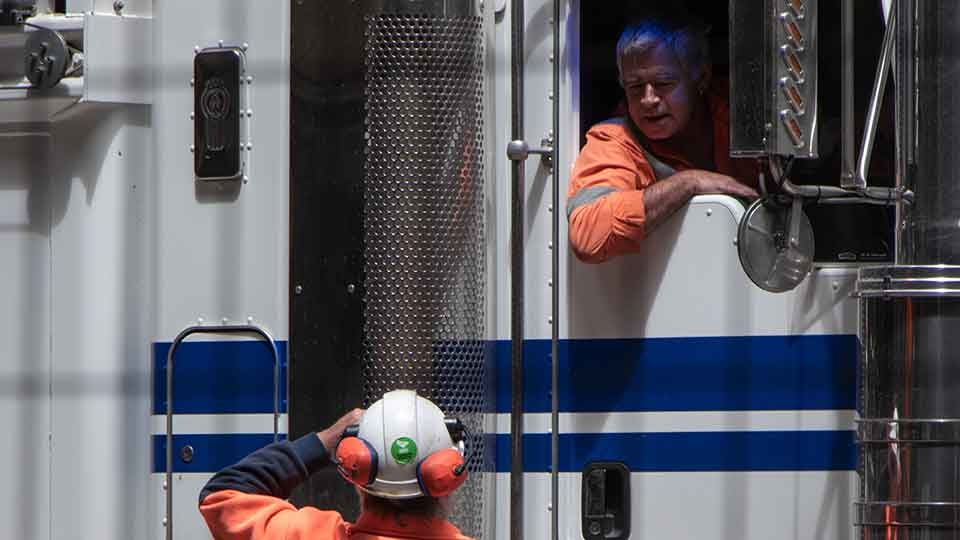In the ever-evolving business world, choosing the right transportation provider for your freight can be an overwhelming decision. It has a major impact on your business operations, shipping costs, efficiency and customer satisfaction.
And there are so many options. Do you choose the local company recommended by your neighbor? Or should you choose one of the larger national carriers you see on the road every day?
It’s an important decision, and it’s not easy to make.
At Anderson Trucking Service (ATS), we are a nationwide carrier who started locally almost 70 years ago. Our passion is helping customers deliver freight to their recipients nationwide, and we know how much depends on your trucking company.
We also recognize that we aren’t the right shipping partner for every company and every load. This article will help you choose between a short-haul (local) and long-haul (over-the-road) carrier. You’ll learn the specialties of each type of company, and the pros and cons of each. This information can help you source the right provider (or providers) for your business.
What Is a Local Carrier?
As the name implies, local carriers serve a smaller radius around their city or town. Although the exact coverage will vary, in general, they can be divided into two categories:
- Hyper-local carriers: Within a 100-mile radius
- Regional carriers: Within a 250-mile radius
Local carriers use drivers who are based in the area they serve and are home every night.
In addition to the area served, the fleet of trucks available differs between short- and long-haul carriers. Local carriers typically use “day cab” tractors, which do not have a sleeping area for the driver. They may also have an assortment of smaller trailers, like box truck and delivery vehicles that are more suitable for residential drop-offs.
While they aren’t right for every customer and every shipment, local carriers have several pros and cons. Understanding these benefits can help you decide which type of carrier is ideal for each load.

Benefits of Using a Local Carrier
Depending on the needs of your business, you may benefit from using a local carrier for three reasons:
- Lower cost
- Familiar faces
- Localized expertise
Lower Cost
Local and regional carriers are often less expensive than nationwide, over-the-road companies. The smaller trucks they use are more fuel efficient and, because they don’t drive as far, they are subjected to less wear and tear.
Driver pay also varies with a local carrier. While long-haul drivers are not directly paid for overnight stays, meals and other on-the-road costs, they do make more money for driving longer distances. Local carriers do not have these costs.
Many local carriers are also smaller operations, with a smaller fleet of trucks and fewer support staff in the office.
And because local vehicles do not leave the area, there are no costs associated with getting back to their home base.
Familiar Faces
Local drivers live and work in the area where they are based. With a smaller, local carrier, frequent shippers are likely to get the same driver regularly, who is familiar with their freight, route(s) and destinations.
Localized Expertise
Short-haul carriers who drive your area on a daily basis know the ins and outs of local traffic and road conditions. They may be better able to navigate, especially in poorly marked areas.
Local carriers are a good choice for freight that has to travel a minimal distance. For these short hauls, they are often the more cost-effective solution, and you get to support a local business while doing your shipping.
Of course, they aren’t right for every situation.
Disadvantages of Local Carriers
Local carriers specialize in simple, short hauls. They are not as well equipped for other types of shipping. The two core downsides of using a local carrier, instead of a nationwide, over-the-road provider, are:
- Limited range of service
- Limited fleet capabilities
Limited Range of Service
The most obvious drawback to a local carrier is that they only travel within their local area. If you need to ship farther or your freight is more complicated, you will need to rely on a different provider.
Limited Fleet Capabilities
Generally, local carriers are smaller operations with a limited fleet. They may not be equipped to carry over-dimensional or specialty freight, or provide some services like tarping.
Note: Some local carriers may offer to try to haul your specialty freight if it’s within their service area. Be cautious before you trust an inexperienced driver or carrier with your valuable assets. Before allowing someone to experiment with your freight, be sure they know what they are doing and have the needed expertise.
Having one or more local carriers on your roster is a good way to save money on short, simple trips. Of course, for nationwide shipping, you will need to work with over-the-road providers as well.
What Is an Over-the-Road Carrier?
Over-the-road trucking companies generally specialize in loads of 450 miles or more. These drivers are used to being on the road for days or weeks at a time and they travel long distances on a regular basis.
A long-haul carrier can be based anywhere in the country. While most specialize in a specific part of the country (for example, east of the Mississippi River), they are the only solution for long-haul cargo.
Just like short-haul carriers, long-haul carriers have pros and cons. Let’s dive into them to help decide between the two.
Benefits of Using an Over-the-Road Carrier
Nationwide freight companies have several advantages, especially if your freight needs to travel a long way or requires special care. Two advantages of using an over-the-road provider are:
- Wider service area
- More resources
Wider Service Area
If your freight needs to be shipped over a long distance, a long-haul carrier is the only way to accomplish this. Their drivers and trucks are equipped for these distances, and will have the know-how and resources to get your cargo safely from origin to destination.
More Resources
Larger, national carriers have a bigger fleet and greater access to specialized trucks, equipment and support staff. This allows them to offer a greater range of services, including heavy haul and critical freight shipping.
Note that not all long-haul carriers are created equal. If you have a specific and specialized need, be sure they can accommodate what you need before loading any freight.
Because of their larger covered area, over-the-road providers are likely to be better experienced and equipped than a local carrier. For some freight, that level of experience will be worth an increased cost (one of the disadvantages of long-haul carriers).
Disadvantages of Over-the-Road Carriers
Over-the-road carriers aren’t the answer for every type of freight. Considering the disadvantages as well as the advantages will help you find the right solution for your business. The largest disadvantage of using these carriers is the increased cost.
Higher Cost
Long-haul carriers with larger fleets and more resources also have higher costs associated with fuel, vehicle maintenance, driver pay and support staff. If you are running simple short-mile loads, these added costs may not be justified for your business.
If a smaller, local carrier isn’t available, a larger nationwide carrier may be able to move your shipment over the shorter distance. Most of the time, they would rather move a load a short 100 miles than have a driver sitting idle in your area.
However, sometimes long-haul carriers will decline these short hauls in favor of a longer trip that keeps the driver busy and is more profitable.
Understanding local and long-haul carriers is the first step in finding the right shipping solution. Now it’s time to analyze both types against your specific needs.
Should I Ship With a Local or Over-the-Road Trucking Company?
When it comes to choosing a trucking company for your business, there’s no right answer.
Or maybe it’s more accurate to say that there are multiple right answers.
Should you choose a local freight carrier? Yes. If you are shipping locally and motivated by cost.
Should you choose a local freight carrier? No. If you are shipping more than 100 miles or so, a short-haul carrier won’t meet your needs.
Should you choose an over-the-road freight carrier? Yes. If you are shipping a long distance or have specialty freight needs, you need a nationwide carrier.
Should you choose an over-the-road freight carrier? No. If you are shipping short distances, a long-haul carrier will not be the most efficient option for you.
So what’s the right choice? The most honest answer is that it depends.
The right choice is most likely a combination of both. Have a local carrier available for short distances of simple freight. Have an over-the-road carrier available for longer distances and more specialized loads.
How to Choose the Right Transportation Carrier for You
So, the million-dollar question remains: should you opt for a local or over-the-road carrier? The answer is not a one-size-fits-all solution. The honest answer is, "It depends." The right choice often lies in finding the ideal combination of both.
Before choosing a carrier for your next load, take time to consider what you are looking for from your provider. Gathering this information can help you decide between a short- and long-haul carrier, and you can use it as the basis for your specification when you have chosen a provider.
- Length of haul. Consider how far your freight will be traveling. This one factor may determine if you need a short- or a long-haul carrier. Enter the origin and destination addresses into a map tool to get the most accurate information on distance.
- Budget. How much are you willing to pay to move this freight? Comparing a local and an over-the-road carrier may come down to the price quoted.
- Type of commodity and dimensions. What you are shipping, and its length, width and height, are critical information your provider will use to assign a truck and consider any special services needed.
Once you have this information, contact a few carriers. Use a search engine to find carriers who serve your area, or ask for a recommendation from others in your industry.
If you’re looking for qualified trucking companies, here are some recommendations.
- Top 15 Flatbed Trucking Companies (& How to Choose)
- The 10 Largest Truckload Van Carriers (And How to Choose)
- 6 Key Factors for Choosing the Right Carrier
If you’re looking for an over-the-road trucking company, our staff at ATS would be happy to assist. For more help finding a transportation provider, download the Freight Carrier Selection Checklist to compare and vet companies in your area.





